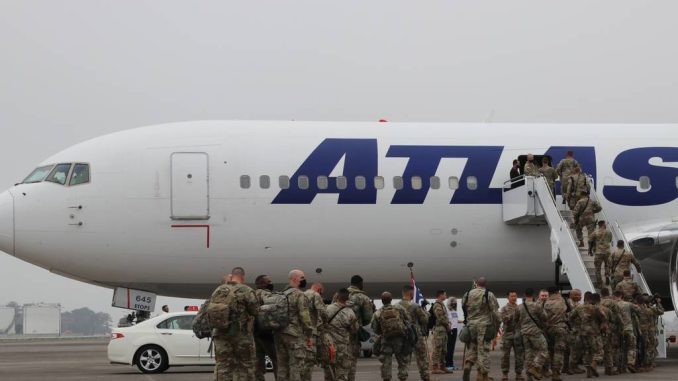
The 14,000 U.S. troops activated in response to Russia’s invasion of Ukraine may not be the last, Pentagon spokesman John Kirby told reporters on Monday.
The U.S. has activated thousands of troops to reassure allies since early this month, including a as-yet-undetermined number who will deploy in support of the NATO Response Force, activated for the first time in its history on Thursday.
“I would not rule out, in the incoming days, additional re-positioning in Europe as appropriate,” Kirby said.
In addition to 80,000 permanently stationed forces, the U.S. has committed 12,000 stateside troops ― and another 2,000 based in Germany, Italy and Greece ― to be stationed in NATO partner nations along Russia’s western border, along with attack helicopters and strike fighter jets.
The latest group left Fort Stewart, Georgia, on Sunday, with members of 1st Armored Brigade Combat Team, 3rd Infantry Division. NATO’s supreme allied commander in Europe announced Thursday that the U.S. had committed 7,000 to the NATO Response Force, who would deploy to Germany but possibly disperse to other countries later on.
The Pentagon has since said that it can’t say whether all 7,000 will be committed to NATO versus unilateral deployments.
RELATED
:quality(70)/cloudfront-us-east-1.images.arcpublishing.com/mco/YDB2NBHIAFAPVFNCWAZ2XGOT54.jpg)
“I don’t have any updates for you on the NATO Response Force or, or the troops that we have contributed,” Kirby said.
There are roughly between 3,000 and 5,000 more stateside troops on heightened alert, Kirby told Military Times on Friday.
“There’s no additional requests for ally support that I’m tracking,” he said Monday.
By and large, the troops activated in Europe are spending their time training with their host nations’ forces. In Poland, where 4,700 soldiers from the 82nd Airborne Division are on the ground, some preparations have been made to assist Americans fleeing Ukraine into Poland.
“Over the last 24 hours, they’ve maybe seen a handful of Americans who were looking for a little bit of assistance,” a senior defense official told reporters Monday. “And by a little bit, I mean, some food, some water, a chance to sit down, internet capability to make to make some flight plans, that kind of thing.”
While U.S. troops are staying out of the fighting, the U.S. government has continued to funnel aid into Ukraine.
“It continues to arrive and continues to get to them, including in just the last day or so,” the official said.
Meghann Myers is the Pentagon bureau chief at Military Times. She covers operations, policy, personnel, leadership and other issues affecting service members. Follow on Twitter @Meghann_MT



Be the first to comment